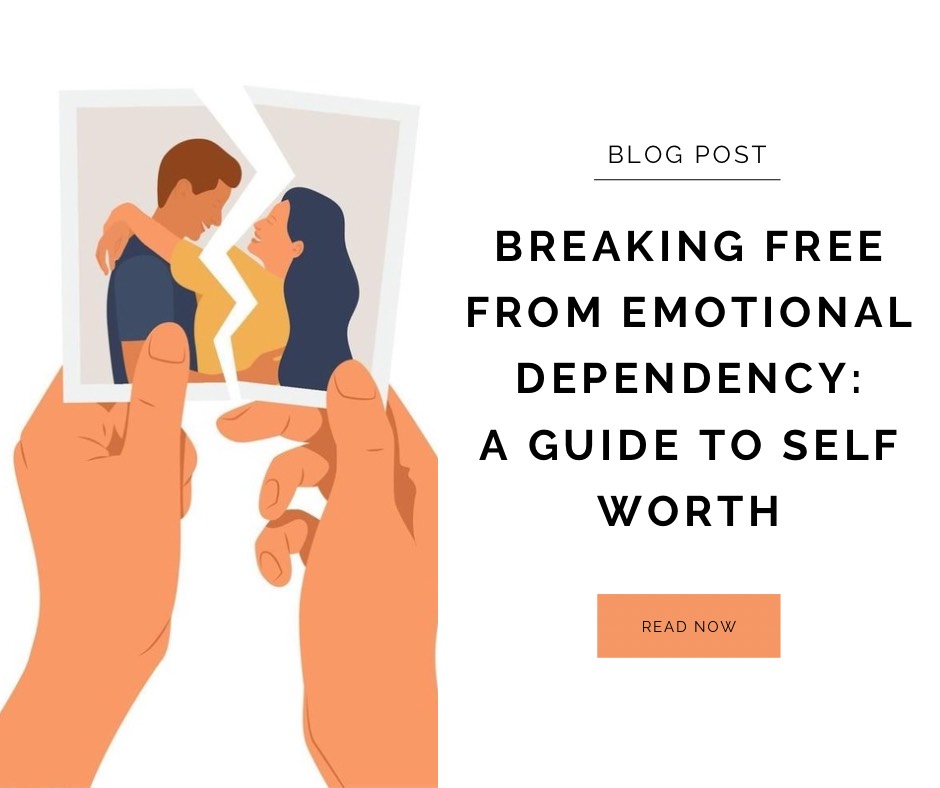BREAKING FREE FROM EMOTIONAL DEPENDENCY: A GUIDE TO BUILDING SELF-WORTH
Relationships are meant to bring out the best in us, providing love, support, and companionship.
However, when emotional dependency sneaks in, it can turn a healthy connection into
something draining and unsustainable. Emotional dependency is often mistaken for deep love or
commitment, but it can erode the foundation of a healthy relationship, leading to imbalance,
resentment, and even toxicity.
What is Emotional Dependency in Relationships?
Emotional dependency occurs when one partner relies excessively on the other for emotional
stability, happiness, and validation. Rather than viewing the relationship as a partnership of two
complete individuals, one person places their entire sense of worth and emotional well-being in
the hands of the other. This can result in clinginess, neediness, and an inability to cope with
separation or autonomy.
For instance, if you constantly need reassurance from your partner or feel anxious when they’re
not around, you might be emotionally dependent. While it’s natural to rely on each other to
some extent, the problem arises when one partner’s emotional state is entirely reliant on the
other’s presence or attention.
Signs of Emotional Dependency in a Relationship
1. Constant Reassurance: Do you frequently need your partner to affirm their love, commitment,
or attraction to you? While occasional reassurance is healthy, constantly seeking it can point to
emotional dependency.
2. Fear of Abandonment: If the thought of your partner leaving triggers overwhelming fear, and
you do everything in your power to keep them close, even at the cost of your own well-being, it’s
a red flag.
3. Jealousy and Possessiveness: Emotional dependency often breeds jealousy. If you feel
threatened by your partner’s friendships or feel uneasy when they spend time with others, this
possessiveness may be a symptom of deeper emotional dependency.
4. Inability to Be Alone: Can you enjoy time alone, or do you feel lost and incomplete without
your partner? If you can’t spend time by yourself without feeling anxious, it’s a sign that your
emotional needs have become too tied to the relationship.
5. Neglecting Your Needs: Are you constantly putting your partner’s needs above your own?
Emotional dependency often leads to self-sacrifice, where one person ignores their own well-
being to keep the relationship intact.
How to Break Free from Emotional Dependency
Recognizing emotional dependency is the first step toward creating a healthier, more balanced
relationship. Here’s how you can start:
1. Cultivate Self-Awareness: Pay attention to your emotional responses in the relationship. Are
you constantly seeking validation? Do you feel panicked at the thought of separation? Reflecting
on these feelings can help you identify patterns of dependency.
2. Develop Your Own Interests: Reclaim your individuality by investing time in hobbies, passions,
and goals outside the relationship. This will help you build self-worth that isn’t tied to your partner.
3. Set Healthy Boundaries: Establish boundaries that promote both emotional closeness and
independence. This means making space for each partner to pursue their own interests and
maintain personal connections outside the relationship.
4. Seek Support: Working with a therapist can help you develop the tools to break free from
emotional dependency. A therapist can guide you in building emotional resilience, improving
self-esteem, and learning to navigate relationships in a healthy way.
5. Communicate Openly: Have an honest conversation with your partner about the dynamics of
your relationship. Open communication can help both partners work together to restore balance
and ensure that neither person feels overwhelmed.
6. Build Emotional Resilience: Instead of relying on your partner to manage all your emotions,
develop strategies to regulate your own emotional needs. This can include mindfulness practices,
journaling, or learning healthy ways to cope with stress.
In Conclusion, healthy Relationships Require Balance. Emotional dependency can quietly
undermine even the strongest relationships, turning what should be a partnership into an
emotional burden. While it’s natural to lean on your partner for support, love, and validation, it’s
essential to maintain your own emotional independence. By recognizing the signs of emotional
dependency and taking steps to address it, you can foster a relationship that’s balanced,
fulfilling, and based on mutual respect and growth.
If you feel that emotional dependency is affecting your relationship, remember that change is
possible. With self-awareness, open communication, and a commitment to personal growth, you
can create a healthier, more resilient connection with your partner.
